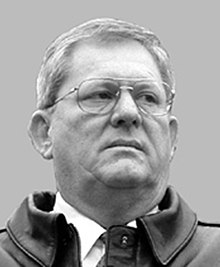Bill Janklow
William John Janklow (September 13, 1939 – January 12, 2012) was an American lawyer and politician and member of the Republican Party who holds the record for the longest tenure as the governor of South Dakota: sixteen years in office.[7] Janklow was shot in the leg while he was part of a detachment that was delivering cannons to Taiwanese troops, and received an honorable discharge as a private first class in 1959.Among the highlights of his term were two cases he argued before the United States Supreme Court, South Dakota v. Opperman and Rosebud Sioux Tribe v.Another initiative that year was to abolish the state's Department of Environmental Protection, allegedly because of its role in efforts by the Sioux to block resource development in the Black Hills.[11] Janklow was successful (5 to 4) in his argument that the state-owned cement plant could legally discriminate against out-of-state buyers in its pricing, which created the "market participant exception" to the U.S. Constitution's Dormant Commerce Clause.The primary battle was considered to weaken Abdnor, contributing to the latter's loss in the general election to Democrat Tom Daschle, then South Dakota's lone member of the U.S. House of Representatives.On August 16, 2003, Janklow was involved in a fatal traffic collision while driving his car, when he failed to stop at an intersection near Trent, South Dakota.In the ensuing investigation, officials determined Janklow was driving at least 70 miles per hour in a 55 mph zone and that he ran a stop sign at the intersection where the crash occurred.[20] Robert O'Shea, an accident reconstruction expert, testified that he estimated the Congressman's speed to be 63 or 64 miles per hour at the time of impact, judging from details from the electronic data recorder of the Cadillac and "his own analysis".[23][24] Two troopers were allowed to testify that they had stopped Janklow for speed in excess of 80 miles per hour while driving on rural roads, but had opted to issue him written warnings rather than traffic citations.[20] On December 8, 2003, Janklow was convicted by a Moody County jury of second-degree manslaughter, a felony, as well as the misdemeanors of speeding, running a stop sign, and reckless driving.[30] The Bureau of Indian Affairs (BIA), then responsible for law enforcement on the reservation, allegedly sent the police investigation case file of the rape (for which it had custody) to its Aberdeen, South Dakota office to keep it away from the Rosebud Sioux Tribal Court.The White House Counsel under President Gerald Ford forwarded its recommendation to the Senate Judiciary Committee, saying its investigation of the rape case concluded there was insufficient evidence.[citation needed] Matthiessen included a statement by Banks about the rape accusation, as well as allegations that during the same period, Janklow had been arrested on the Rosebud reservation for driving drunk and shooting pet dogs.Janklow, by then serving as governor, sued both the author and publisher Viking Press for libel, which delayed publication of the paperback version of the book until 1992.[31][32][34][35] Janklow's complaint, referring to the statement by Banks about rape, "cited a 1975 letter from Philip Buchen, head of the Office of Counsel to the President of the United States, to the Senate Committee on Labor and Public Welfare, saying that three Federal investigations found the allegations against him 'simply unfounded.'He filed a libel suit against Newsweek based on an article in the weekly's February 21, 1983, issue that included the disputed passage by Dennis Banks.[36] After January 5, 2006 (effective February 2006), when the South Dakota Supreme Court granted his petition for early reinstatement of his license to practice law, Janklow worked as an attorney.

Governor of South DakotaCarole HillardWalter Dale MillerMike RoundsLowell HansenHarvey WollmanGeorge S. MickelsonU.S. House of RepresentativesSouth Dakotaat-largeJohn ThuneStephanie Herseth SandlinAttorney General of South DakotaRichard KneipKermit SandeMark MeierhenryChicagoIllinoisSioux Falls, South DakotaBlack Hills National CemeteryRepublicanUniversity of South DakotaUnited StatesUnited States Marine Corps3rd Marine DivisionSecond Taiwan Strait CrisisTaiwanRepublican Partythird-longest gubernatorial tenureAttorney GeneralUnited States House of RepresentativesmanslaughterNuremberg TrialsFlandreauU.S. Marine CorpsCamp PendletonCaliforniaCamp KinserOkinawaQuemoy-Matsu international crisisBachelor of ScienceUniversity of South Dakota School of LawLegal ServicesRosebud Indian ReservationUnited States Supreme CourtSouth Dakota v. OppermanBlack Hillsinterest ratesCitibankSioux FallsReeves, Inc. v. StakeDormant Commerce ClauseMilwaukee RailroadBurlington NortherndisabledU.S. SenatorJames AbdnorTom DaschleDennis DaugaardAssociated PressArgus Leadermarijuana2002 United States House of Representatives election in South DakotaDemocraticStephanie Herseth2004 South Dakota's at-large congressional district special electionTrent, South Dakotaarraignedhypoglycemiainsulin shotaccident reconstructionelectronic data recorderMoody Countycommunity serviceFederal Tort Claims ActJancita Eagle DeerDennis BanksBureau of Indian AffairsAberdeen, South DakotaLegal Services CorporationPresident Gerald FordLeonard Crow DogPeter MatthiessenViking PressIn the Spirit of Crazy HorseNewsweekAmerican Indian MovementFirst AmendmentPhilip BuchenUnited States Court of Appeals for the Eighth Circuiten bancSouth Dakota Supreme CourtMayo ClinicDM&E Railroadhalf staffSturgis, South DakotaList of American federal politicians convicted of crimesList of federal political scandals in the United Statespublic domain materialNewspapers.comRapid City JournalHalberstam, DavidPrinceton Architectural PressMinnesota Public RadioBlack Hills PioneerBiographical Directory of the United States CongressC-SPANFind a GraveKermit A. SandeMark V. MeierhenryGeorge MickelsonWalter MillerSouth Dakota's at-large congressional districtGovernorslieutenant governorsMelletteSheldonHerreidCrawfordVesseyNorbeckMcMasterGundersonJensenBushfieldSharpe